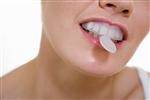 |
 |
 |
||
    |
||||
|
||||

Home teeth whiteners may weaken enamel
|
|
Reuters Health
Thursday, April 23, 2009

NEW YORK (Reuters Health) - Teeth bleaching products for home use may minimally reduce the surface hardness of tooth enamel and enamel's ability to "bounce back" from normal wear and tear, a laboratory study suggests.
Still, "the public should not be alarmed of the bleaching process," said Dr. Shereen S. Azer, at The Ohio State University College of Dentistry in Columbus.
"In reality -- or clinically speaking -- these effects may not be detectable," Azer told Reuters Health.
Moreover, Azer said, "human enamel has been shown to heal itself and 'remineralize' over time, meaning it has the ability to restore back the levels of surface calcium that has been lost due to bleaching." This is particularly evident with subsequent fluoride treatments and use of fluoride toothpastes.
Azer and colleagues used a nanometer scale - the equivalent of one over a billionth of a meter - to measure the hardness and elasticity of tooth enamel both before and after laboratory exposures to over-the-counter teeth bleaching solutions.
The researchers exposed 50 human tooth samples to 2 types of whitening strip and 3 types of nightguard home bleaching systems,
Ten tooth samples each underwent bleaching regimens according to either the 3-week or 10-day manufacturer recommended treatment protocol. The 5 remaining tooth samples served as unbleached "controls."
Compared with before bleaching and versus unbleached controls, the bleached enamel showed significant decreases in hardness on the nanometer scale, the investigators report in the Journal of Dentistry.
The researchers also observed a significant decrease in enamel elasticity in most bleached tooth samples compared with unbleached controls.
More study into the long term effects of bleaching agents and remineralization of tooth enamel would be worthwhile, the researchers conclude.
SOURCE: Journal of Dentistry, March 2009.
Reuters Health
© 2009 Thomson Reuters. All rights reserved. Reuters content is the intellectual property of Thomson Reuters or its third party content providers. Any copying, republication or redistribution of Reuters content, including by framing or similar means, is expressly prohibited without the prior written consent of Thomson Reuters. Thomson Reuters shall not be liable for any errors or delays in content, or for any actions taken in reliance thereon. "Reuters" and the Reuters Logo are trademarks of Thomson Reuters and its affiliated companies. For additional information on other Reuters media services please visit http://about.reuters.com/media/.
More News on this Date
Related MedlinePlus Pages:
| Home | Health Topics | Drugs & Supplements | Encyclopedia | Dictionary | News | Directories | Other Resources | |
| Disclaimers | Copyright | Privacy | Accessibility | Quality Guidelines U.S. National Library of Medicine, 8600 Rockville Pike, Bethesda, MD 20894 National Institutes of Health | Department of Health & Human Services |
Date last updated: 24 April 2009 |
